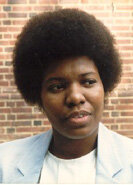The First Black Woman PhD Astronomer: Barbara A. Williams
Olivia Wilkins
I was really excited to learn that the first Black woman to hold a PhD in astronomy is a radio astronomer. Her name is Barbara A. Williams.
Barbara A. Williams is the first Black woman to receive a PhD in astronomy, a feat accomplished in 1981 at the University of Maryland at College Park, 20 years after Dr. Harvey Washington Banks became the first Black American ever to earn an astronomy PhD. Dr. Williams also holds a BA in Physics from UNC Greensboro and an MS in Radio Astronomy from the University of Maryland. After her studies, Dr. Williams continued radio astronomy research at the National Radio Astronomy Observatory in Virginia and at UNC Chapel Hill. Most recently, she was a professor at the University of Delaware in the Department of Physics and Astronomy.
The only photograph I could find of Dr. Williams, which comes from her Astronomers of the African Diaspora page.
Throughout her active research career, Dr. Williams’s primary research area was radio observations of compact groups of galaxies. Her publications listed on the Astrophysics Data System (ADS) include studies of:
observations of neutral atomic hydrogen in elliptical galaxies,
neutral hydrogen observations toward the IC 698 group of galaxies, and
a double galaxy system and intergalactic gas clouds produced by colliding galaxies.
It looks like the last astronomy paper published by Dr. Williams came out in 2002.
As a radio astronomer who is also interested in learning about effective teaching pedagogy, I was excited to learn that Dr. Williams got involved in education research before retiring. She was particularly interested in studying the recruitment and retention of undergraduate women in physics programs. In a 2007 article published in the Journal of Women and Minorities in Science and Engineering, Dr. Williams and colleagues looked at women’s colleges as examples for recruitment and compared those programs to coed programs.
Dr. Williams is recognized as a Fellow of the National Society of Black Physicists (NSBP), an honor given to members of the NSBP who have made contributions to the advancement of physics, either in their research or service. She was also recognized with the Outstanding Young Woman of America award in 1986.
Since Barbara A. Williams earned her PhD in astronomy in 1981, fewer than 20 additional Black women have earned PhDs in astronomy. Nevertheless, there are lots of Black space scientists and engineers out there doing cool science across all different astronomy sub-disciplines. You can learn more by checking out #BlackInAstro on Twitter, the Astronomers of the African Diaspora web page curated by Mathematicians of the African Diaspora, and a list of “Careers of African Americans in Academic Astronomy” published in the Journal of Blacks in Higher Education (also available as a pre-print under the title “From Banneker to Best: Some Stellar Careers in Astronomy and Astrophysics”). I also recommend reading this guest post on the NRAO blog by Moiya McTier, an astronomy PhD candidate at Columbia University. To learn more about how to support Black astronomers, including a reading list, check out the AstroBites post all about how to support Black folks, both in the short-term and long-term.
As for Dr. Williams, it seems she retired (as listed in her African American Women in Physics profile) around a decade ago. I couldn’t find anything more current about her, and the historian who wrote about Black astronomers for the Journal of Blacks in Higher Education also seems to have disappeared from the web after retiring. If you’d like to share anything else about Dr. Williams, drop a comment below!

